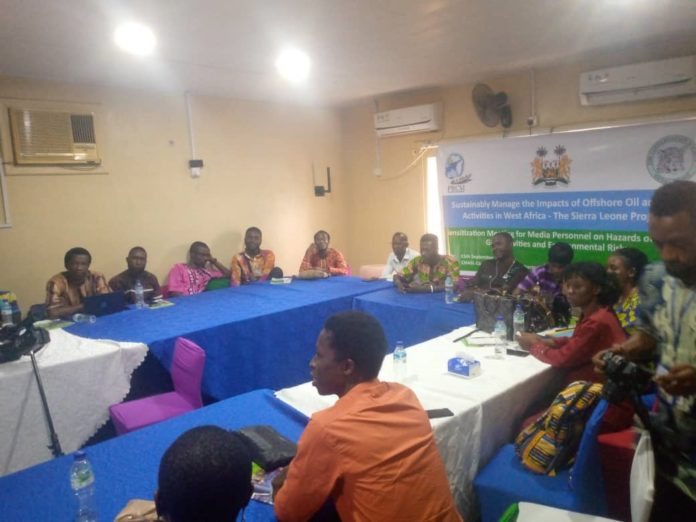By Ishmael Dumbuya & Mohamed J Kargbo
President of the Conservation Society of Sierra Leone (CCSL), Charles Showers, has noted that as the country braces itself to commence the exploration and production of oil and gas there is the likelihood for the operations to lead to impacts that should be examined on a case by case basis.
He underscores the significance of shedding lights on the hazards and environmental risks involved in such activities.
Showers was addressing journalists at a workshop held at the Christian Health of Sierra Leone (CHASL) Hall, Kingharman Road in Freetown.
He explained that oil and gas help boom other countries economy as it cut across political spectrum and all walks of life, albeit exploration brings with it dire consequences, especially against the environment.
“The marine ecosystem is mostly affected by these activities and the marine provides wide range of food services, including the food in the form of fish. And, if there is an oil spillage into the marine environment it may affect farming activities as well as cause climate change,” he noted.
He went on to state that Sierra Leone is signatory to many international instruments geared towards the protection and conservation of marine environment and biodiversity, including the Abidjan Convention, the International Convention for the Prevention of Pollution from Ships, (MARPOL), and the International Convention on Oil Pollution and Prevention Response and Cooperation (OPRC).
He said member states in the sub region should be compelled to localise actions and solutions that would ensure the sustainable protection of the marine environment and its biodiversity.
Mustapha Koroma, a Senior Geologist at the Petroleum Regulatory Agency, (PRA), shed lights on the environmental hazards gas and oil explorations brings with it.
He noted that exploration and production of oil and gas has a tendency to inducing cultural, social and economic changes.
According to him, land use patterns, like agriculture and fishing, as well as other secondary impacts like new access routes, lead to informal settlement and creation of natural resources.
He went on to indicate that fugitive gases from loading operations and losses from process equipment also affect the environment and indicated that even though the country is believed to have done a lot in terms of putting the required regulatory framework and establishing relevant institutions to regulate the activities in the oil and gas sector, still there are numerous challenges that require serious attention by government.
“It’s against that backdrop that CCSL was given the mandate to develop and distribute a white paper to relevant authorities on the shortcomings of national institutions in oil and gas sector with key recommendations for implementation,” he said.
The Communication Manager, Conservation Society of Sierra Leone, Abdul K. Dumbuya, warned Sierra Leoneans over the kick-start of oil and gas production, which he said may affect the marine life and environment in the near future, if necessary measures are not instituted.
He stated that in a bid to strengthen the petroleum sector and also present the country with the expected readiness recommended by international standards for the commencement and operationalization of offshore oil and gas extraction and production, the various challenges outlined need to be addressed by the Government of Sierra Leone.





